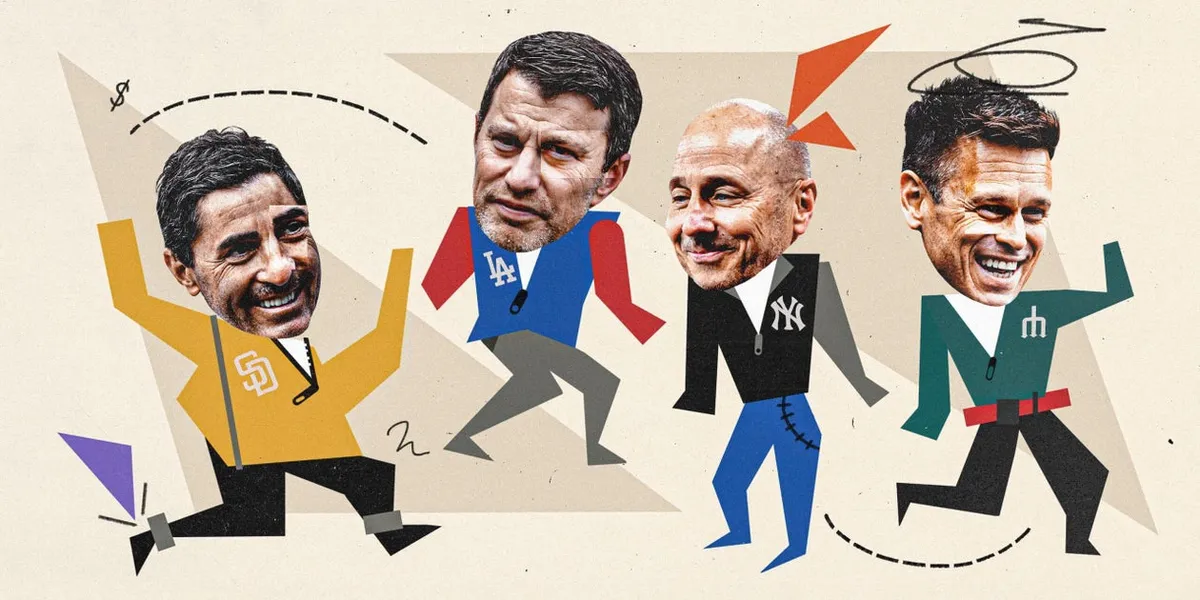
The Athletic provides live coverage of the 2025 MLB trade deadline, marking the beginning of an insightful three-part series that delves into the impact of MLB executives' personalities on baseball's trade dynamics. Stay tuned for part two, which will be released on Tuesday. The display screen on Jerry Dipoto’s iPhone can evoke feelings of either despair or delight, depending on who is calling. “Sometimes, the phone rings and the first thought is, ‘Oh, god,’” Dipoto shared. “You know that the chances of finalizing a deal aren’t very high.” As the President of Baseball Operations for the Seattle Mariners, Dipoto's mood shifts dramatically when he receives a call from A.J. Preller, his counterpart at the San Diego Padres. Both clubs share a spring training complex and a mutual affinity for making deals.
“We know each other’s players inside and out,” Dipoto remarked. “I'd be lying if I said both A.J. and I don’t enjoy making trades. It's exciting to explore what's possible.” As the trade deadline approaches, executives must quickly determine which players from rival teams are available and how to acquire them. This requires not only strategic thinking but also a keen understanding of how their peers view the game and operate within it. The personalities of Major League Baseball executives create a complex undercurrent in trade negotiations.
In the world of MLB trades, there are various archetypes among executives. Some are hunters, who pinpoint their targets and express clear demands. Others resemble fishermen, casting wide nets across the sport for potential deals. Then there are volume shooters, who prioritize completing transactions over maximizing returns in every deal. Dealing with certain teams, like the Colorado Rockies, can be exasperating, while negotiating with others, such as the Cleveland Guardians, can feel like an exquisite game of chess.
Executives like Milwaukee Brewers GM Matt Arnold are known for sketching elaborate three-team trades, while others, like Arizona Diamondbacks GM Mike Hazen, prefer to keep things straightforward. “I’m not smart enough to do it,” Hazen admits. Meanwhile, Tampa Bay Rays president Erik Neander opts for texting to discuss deals, while executives like Anthopoulos and Preller enjoy engaging in banter over the phone. As Preller noted, understanding how to connect with counterparts is vital: “You talk to everyone a little differently, based on past history and what might resonate with them.”
To grasp these interpersonal dynamics as the trade deadline looms, The Athletic consulted over two dozen executives about how relationships can facilitate transactions. Many requested anonymity to speak candidly about their competitors. The discussions resulted in a partial taxonomy of decision-making styles among executives preparing for deadline dealings. In other words, when the phone rings, do you want to answer it?
A few days after the 2022 World Series, Alex Anthopoulos approached Kansas City Royals executive J.J. Picollo at the GM Meetings in Las Vegas. Although they had known each other for years, they were not particularly close. Anthopoulos was interested in trading pitcher Jake Odorizzi and wondered if Kansas City would be interested. Picollo, still familiarizing himself with the transactional rhythms of his new role, remarked, “The next day, Anthopoulos traded him. I learned something: when he calls, it’s going to happen.”
Formerly the assistant GM of the Toronto Blue Jays, Anthopoulos grew frustrated with the time wasted in offseason meetings speculating about trade targets. “Why aren’t we just asking directly?” he recalled thinking. This mindset has served him well as he established himself as one of baseball's foremost hunters. His straightforward nature is appreciated by peers, who often find themselves trying to keep up with his rapid-fire conversation style.
When Jerry Dipoto took over as GM of the Mariners, he looked to emulate the Tampa Bay Rays—a franchise known for its high transaction volume. Since his arrival, Dipoto has executed a staggering 185 trades, demonstrating a willingness to make deals that others might shy away from. “We’ve made an absurd number of trades over time,” Dipoto remarked. “The reputation we have in the industry is probably deserved.”
This approach has earned Dipoto the title of the premier trader of his era. He continues to be active, recently acquiring slugger Josh Naylor from the Diamondbacks to bolster his team's playoff push. If Dipoto sees Preller’s name on his phone, he knows there could be enticing opportunities awaiting him.
Negotiating with the Cleveland Guardians is often described as a challenging experience. Rival executives have coined the phrase “Cleveland Grind Machine” to characterize their approach, which involves keeping discussions vague and pushing for every available asset until the final moments of negotiation. Chris Antonetti, the Guardians’ president, acknowledges the difficulties but stands firm in their disciplined strategy, emphasizing the necessity of making smart, calculated decisions.
In contrast, the Colorado Rockies have faced criticism for their reluctance to engage in trades, which has begun to shift as they flirt with historical lows. As the 2025 trade deadline approaches, the dynamics of the MLB landscape will continue to evolve, influenced strongly by the personalities and strategies of the executives involved.
As we delve deeper into the personalities that shape MLB trades, the upcoming installments will explore more about the 2025 MLB trade deadline and the intriguing relationships among baseball's decision-makers.